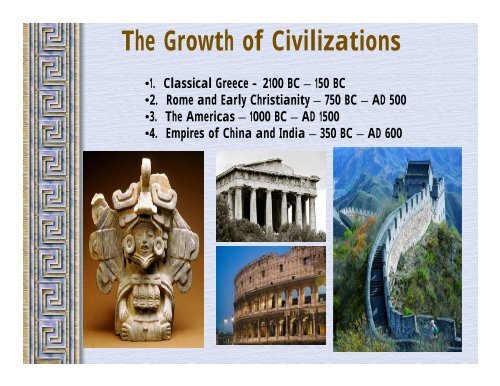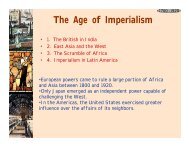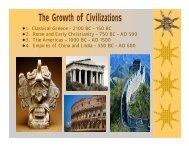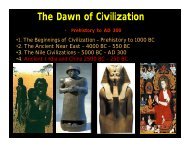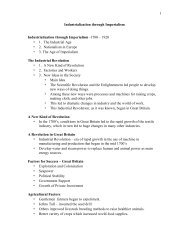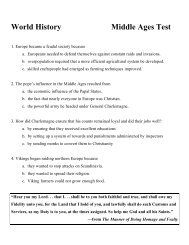2100 BC â 150 BC
2100 BC â 150 BC
2100 BC â 150 BC
Create successful ePaper yourself
Turn your PDF publications into a flip-book with our unique Google optimized e-Paper software.
The Growth of Civilizations<br />
•1. Classical Greece - <strong>2100</strong> <strong>BC</strong> – <strong>150</strong> <strong>BC</strong><br />
•2. Rome and Early Christianity – 750 <strong>BC</strong> – AD 500<br />
•3. The Americas – 1000 <strong>BC</strong> – AD <strong>150</strong>0<br />
•4. Empires of China and India – 350 <strong>BC</strong> – AD 600
Ancient Greece<br />
<strong>2100</strong> <strong>BC</strong> to <strong>150</strong> <strong>BC</strong><br />
1. Early Greece<br />
2. The Classical Age<br />
3. Greek Achievements<br />
4. Alexander the Great<br />
•The small, rugged peninsula in southern Europe –<br />
Greece – home of early advanced civilizations<br />
•From the Minoans and the Mycenaeans to Sparta<br />
and Athens to the empire of Alexander the Great, the<br />
Greeks left a legacy that helped shape Western<br />
Civilization
•Centered around trade
•<strong>2100</strong> – <strong>150</strong> <strong>BC</strong><br />
The Geography of Greece<br />
•Ancient Greece is located<br />
in southern Europe.<br />
•It is located on the<br />
Mediterranean and Aegean<br />
seas.<br />
•The land is mountainous<br />
and the civilization does<br />
not grow around a river.
Bronze Age Greece<br />
•<strong>2100</strong> – <strong>150</strong> <strong>BC</strong>
Crete: Minoan Civilization<br />
(Palace at Knossos)<br />
•<strong>2100</strong> – <strong>150</strong> <strong>BC</strong><br />
•The Minoans<br />
were the earliest<br />
people in the<br />
Region.<br />
•They were<br />
traders but their<br />
civilization<br />
disappeared<br />
around 1400 <strong>BC</strong>.
Minoan Civilization<br />
•<strong>2100</strong> – <strong>150</strong> <strong>BC</strong><br />
oExcavations done at Knossos<br />
reveal clues about their life:<br />
oPrivate rooms<br />
oBasic Plumbing<br />
oArtwork- tied to the sea
Minoan Civilization<br />
•<strong>2100</strong> – <strong>150</strong> <strong>BC</strong><br />
•Language-<br />
Linear A-<br />
cant decipher<br />
•Most Minoan images of priests are women
•<strong>2100</strong> – <strong>150</strong> <strong>BC</strong><br />
The Mycenaean Civilization<br />
•The Mycenaeans arose next<br />
and were most famous for the<br />
Trojan War.<br />
• They declined around 1200<br />
<strong>BC</strong>.
The Trojan Wars<br />
•<strong>2100</strong> – <strong>150</strong> <strong>BC</strong><br />
• Fought between Troy (Turkey) and Mycenae (Greece)<br />
• The Trojan Horse-not sure if the battle took place
•<strong>2100</strong> – <strong>150</strong> <strong>BC</strong><br />
Homer: The “Heroic Age”<br />
•The Odyssey – the account of Greek hero – Odysseus in the Trojan War<br />
•The Ilaid is the second account
•<strong>2100</strong> – <strong>150</strong> <strong>BC</strong><br />
The Mask of Agamemnon<br />
•King of Mycenae<br />
who was murdered<br />
by his wife’s<br />
mistress
•<strong>2100</strong> – <strong>150</strong> <strong>BC</strong>
•<strong>2100</strong> – <strong>150</strong> <strong>BC</strong><br />
The Rise of Greek City States<br />
The region declined for<br />
hundreds of years after the<br />
Mycenaeans.<br />
Around 750 <strong>BC</strong>, the Greek<br />
City state, or polis, starts<br />
to develop.<br />
Cities were built on two<br />
levels, with an acropolis on<br />
the top level.
Governing the City State<br />
•<strong>2100</strong> – <strong>150</strong> <strong>BC</strong><br />
• At first, city states were ruled by one person, usually a king.<br />
This is called a monarchy. They were often called tyrants.<br />
• Next, it was ruled by a small group of nobles. This is called<br />
an oligarchy.<br />
• New forms of government – democracy would soon develop,<br />
especially in Athens.
•<strong>2100</strong> – <strong>150</strong> <strong>BC</strong><br />
The Rest of the City States<br />
Below the Acropolis was the<br />
walled part of the city where<br />
everyday life took place.<br />
There were marketplaces,<br />
theaters, public buildings,<br />
and homes.<br />
The market was called the<br />
agora. It was usually in the<br />
center of the city.
•<strong>2100</strong> – <strong>150</strong> <strong>BC</strong><br />
Sparta<br />
Sparta is a city state<br />
that develops into a<br />
warrior society.<br />
Men spend their lives<br />
dedicated to warfare<br />
and training.<br />
Some women took up<br />
household and economic<br />
responsibilities because<br />
the men were occupied<br />
with war.
Sparta Military Might<br />
•<strong>2100</strong> – <strong>150</strong> <strong>BC</strong><br />
•Helots Messenians enslaved by the Spartans.
The Gods of Olympus<br />
•<strong>2100</strong> – <strong>150</strong> <strong>BC</strong><br />
• The Acropolis<br />
• The acropolis of each city had<br />
temples to the Greek gods<br />
and goddesses.<br />
• The Greeks shared one set of<br />
Gods. There were 12 major<br />
gods and goddesses.
Mount Olympus, Home of the<br />
Gods<br />
•<strong>2100</strong> – <strong>150</strong> <strong>BC</strong>
•<strong>2100</strong> – <strong>150</strong> <strong>BC</strong><br />
The Gods of Olympus
Athens<br />
•<strong>2100</strong> – <strong>150</strong> <strong>BC</strong>
•<strong>2100</strong> – <strong>150</strong> <strong>BC</strong><br />
Athens: Yesterday and Today<br />
•Athens is a city state that develops into a<br />
democracy.<br />
•A democracy is a place where people vote.<br />
•Only male citizens could vote.<br />
•Athens also focused on arts and learning.
•<strong>2100</strong> – <strong>150</strong> <strong>BC</strong><br />
Early Athenian Lawgivers<br />
$ Draco<br />
• “draconian”<br />
• End Unrest through<br />
harsh punishment<br />
$ Solon-took first steps<br />
toward democracy<br />
$ Cleisthenes<br />
• created the first<br />
democracy!
•<strong>2100</strong> – <strong>150</strong> <strong>BC</strong><br />
Piraeus: Athens’ Port City
Persian Wars: 499 <strong>BC</strong>E – 480 <strong>BC</strong>E<br />
•Fought between Greece and Persia –<br />
•Cause of Conflict region called Ionia<br />
•<strong>2100</strong> – <strong>150</strong> <strong>BC</strong>
Persian Wars: Famous Battles<br />
$ Marathon (490 <strong>BC</strong>E)<br />
• 26 miles from Athens<br />
• Inspired the Marathon-Greek victory<br />
$ Thermopylae (480 <strong>BC</strong>E)<br />
• 300 Spartans were able to hold back<br />
a much larger Persian army<br />
$ Salamis (480 <strong>BC</strong>E)<br />
• Athenian navy Victory<br />
•<strong>2100</strong> – <strong>150</strong> <strong>BC</strong>
Golden “Age of Pericles”:<br />
460 <strong>BC</strong>E – 429 <strong>BC</strong>E<br />
•<strong>2100</strong> – <strong>150</strong> <strong>BC</strong><br />
•The most influential politician in Athens for<br />
many years following the Persian Wars
Peloponnesian Wars<br />
•<strong>2100</strong> – <strong>150</strong> <strong>BC</strong><br />
Athens –Delian League<br />
Sparta-Pelponnesian League<br />
Tension between the two leagues; Sparta<br />
becomes the superpower<br />
Later fell to Macedonia
•<strong>2100</strong> – <strong>150</strong> <strong>BC</strong><br />
• Philosophy<br />
• Religion<br />
• Art and Architecture<br />
• Sport
Socrates<br />
•<strong>2100</strong> – <strong>150</strong> <strong>BC</strong><br />
•Socrates was a famous Athenian<br />
philosopher.<br />
•He taught Plato, who then taught<br />
Aristotle.<br />
•He was accused of corrupting the<br />
minds of the youth and forced to<br />
commit suicide.<br />
•Know thyself!<br />
•question everything<br />
•only the pursuit of goodness<br />
brings happiness.
Plato<br />
•<strong>2100</strong> – <strong>150</strong> <strong>BC</strong><br />
•Philosophers were best suited<br />
to govern<br />
•The Academy<br />
•The World of Forms<br />
•The Republic – philosophers<br />
should be king
•<strong>2100</strong> – <strong>150</strong> <strong>BC</strong><br />
Aristotle<br />
•Concerned with nature and the<br />
world around him<br />
•The Lyceum and the Golden<br />
Mean<br />
•Everything in moderation<br />
•Logic empowers reason<br />
•Scientific method
Hippocrates<br />
•<strong>2100</strong> – <strong>150</strong> <strong>BC</strong><br />
•Hippocrates was a famous Greek<br />
doctor.<br />
•Doctors today still take the<br />
Hippocratic Oath when they begin their<br />
careers in medicine.<br />
•Its most important part is to do no<br />
harm.
Herodotus<br />
•<strong>2100</strong> – <strong>150</strong> <strong>BC</strong><br />
•Herodotus is famous for creating<br />
maps of the Ancient Greek world.<br />
•He tried to determine what existed<br />
beyond what the Greeks themselves<br />
knew about.
•<strong>2100</strong> – <strong>150</strong> <strong>BC</strong><br />
Sophocles<br />
• Sophocles was a famous<br />
Greek dramatist.<br />
• There were two main types of<br />
plays: comedies and<br />
tragedies.<br />
• These plays were very popular<br />
in Greece.
•<strong>2100</strong> – <strong>150</strong> <strong>BC</strong><br />
Phidias’ Acropolis
The Acropolis Today<br />
•<strong>2100</strong> – <strong>150</strong> <strong>BC</strong><br />
•Temples for the Gods
The Parthenon<br />
•<strong>2100</strong> – <strong>150</strong> <strong>BC</strong><br />
•Temple of the Greek Goddess Athena
The Agora<br />
•<strong>2100</strong> – <strong>150</strong> <strong>BC</strong>
•<strong>2100</strong> – <strong>150</strong> <strong>BC</strong><br />
The Classical Greek “Ideal”
Ionic<br />
Greek Columns<br />
Doric<br />
•<strong>2100</strong> – <strong>150</strong> <strong>BC</strong><br />
Corinthian
Olympia<br />
•<strong>2100</strong> – <strong>150</strong> <strong>BC</strong>
The Ancient Olympics:<br />
Athletes & Trainers<br />
•<strong>2100</strong> – <strong>150</strong> <strong>BC</strong>
•<strong>2100</strong> – <strong>150</strong> <strong>BC</strong><br />
The Olympic Games<br />
The ancient Greeks<br />
started the Olympic<br />
games.<br />
They were held to honor<br />
the gods.<br />
There were races,<br />
discuss throwing,<br />
boxing, and a no-holds<br />
barred type of fighting<br />
called pankration.<br />
Only eye gouging and<br />
biting were prohibited.
•<strong>2100</strong> – <strong>150</strong> <strong>BC</strong><br />
Olympia: Temple to Hera
•<strong>2100</strong> – <strong>150</strong> <strong>BC</strong><br />
The 2004 Olympics
•<strong>2100</strong> – <strong>150</strong> <strong>BC</strong><br />
Macedonia Under Philip II<br />
•Took over Greece along with his son, Alexander the Great
•<strong>2100</strong> – <strong>150</strong> <strong>BC</strong>
Alexander the Great<br />
•<strong>2100</strong> – <strong>150</strong> <strong>BC</strong><br />
•Took over, at age 20,<br />
after his father was<br />
assassinated
•<strong>2100</strong> – <strong>150</strong> <strong>BC</strong><br />
Alexander the Great’s Empire
•<strong>2100</strong> – <strong>150</strong> <strong>BC</strong><br />
Alexander the Great in Persia<br />
•Within a year, Alexander conquered Persia
Phalanx tactic<br />
•<strong>2100</strong> – <strong>150</strong> <strong>BC</strong>
•<strong>2100</strong> – <strong>150</strong> <strong>BC</strong><br />
The Hellenization of Asia<br />
•Greek Like Culture mixed with others throughout Asia
•<strong>2100</strong> – <strong>150</strong> <strong>BC</strong><br />
Pergamum: A Hellenistic City
•<strong>2100</strong> – <strong>150</strong> <strong>BC</strong><br />
The Economy of the Hellenistic World
•<strong>2100</strong> – <strong>150</strong> <strong>BC</strong><br />
Hellenistic Philosophers<br />
$ Cynics Diogenes<br />
• ignore social conventions &<br />
avoid luxuries.<br />
• citizens of the world.<br />
• live a humble, simple life.<br />
$ Epicurians Epicurus<br />
• avoid pain & seek pleasure.<br />
• all excess leads to pain!<br />
• politics should be avoided.
Hellenistic Philosophers<br />
$ Stoics Zeno<br />
• nature is the expansion of divine will.<br />
• concept of natural law.<br />
• get involved in politics, not for personal gain<br />
but to perform virtuous acts for the good of all.<br />
• true happiness is found in<br />
great achievements.<br />
•<strong>2100</strong> – <strong>150</strong> <strong>BC</strong>
•<strong>2100</strong> – <strong>150</strong> <strong>BC</strong><br />
Hellenism: The Arts & Sciences<br />
$ Scientists / Mathematicians:<br />
• Aristarchus heliocentric theory.<br />
• Euclid geometry<br />
• Archimedes pulley<br />
• Eratosthenes- calculated the size of the world<br />
$ Hellenistic Art:<br />
• More realistic; less ideal than Hellenic art.<br />
• Showed individual emotions, wrinkles, and age!
•<strong>2100</strong> – <strong>150</strong> <strong>BC</strong><br />
The Breakup of Alexanders Empire<br />
•Alexander died in Babylon in 323 <strong>BC</strong> At age 33


